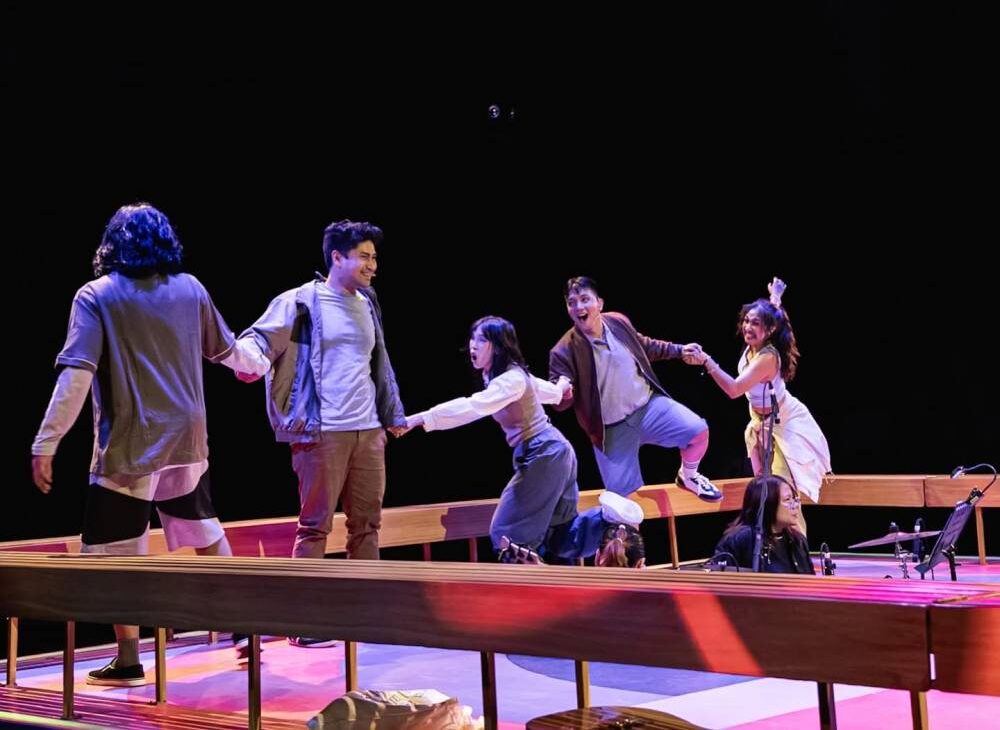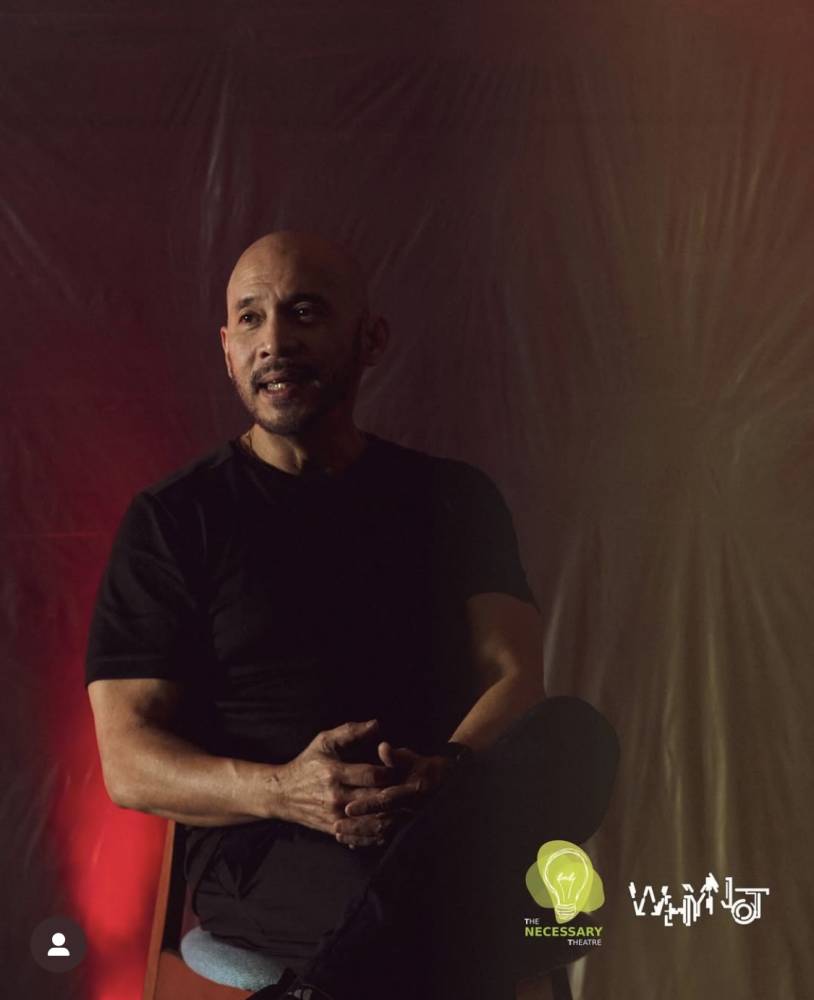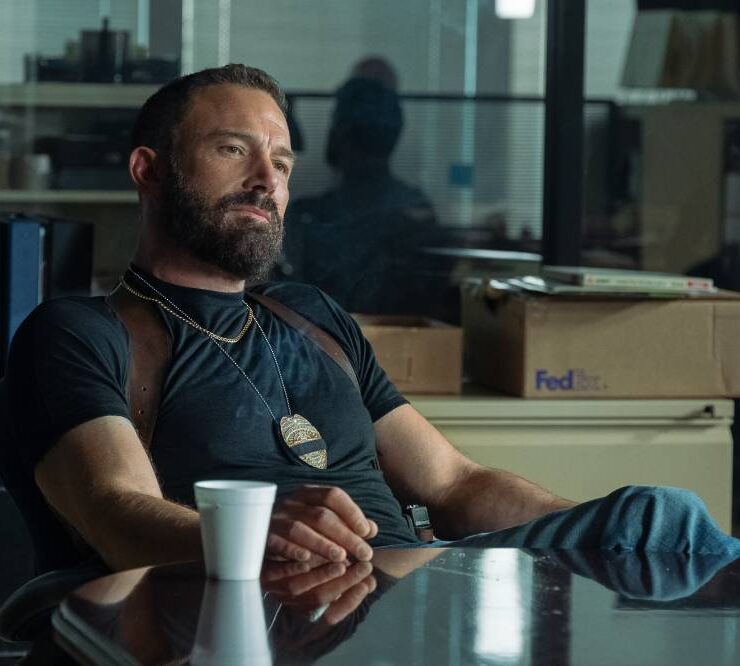Soaring through technical difficulties

Let me start with a disclosure: The performance I caught of The Necessary Theatre’s “Via Dolorosa” was, in a way, a private audience with actor-director Bart Guingona.
Plagued by unforeseen technical difficulties, the May 3 matinee I was supposed to watch instead became a closed-door, start-to-finish run-through, with only me and TheaterFansManila founder and managing editor Frida Tan in attendance. It gives me great pleasure to say, then, that what we saw was essentially unimprovable.
The production is, first of all, testament to the idea that having a solid text is already half the job done.
Written in the late 1990s by the British playwright David Hare, the play might as well have been made today, its urgency deafening as it tackles in monologue form that singular, lopsided conflict in the Middle East that has led to “the most documented genocide” of our lifetime.
“Via Dolorosa” is Hare’s attempt at making sense of his trip to Israel and the occupied Palestinian territories during that decade. His approach is very much ethnographic: Working in travelogue-adjacent first person, Hare locates his self-aware, British fish-out-of-water point of view within the lived experiences of the people he encountered then—in Israel, in an Israeli settlement in the West Bank, in Gaza itself.
The result is, thank heavens, a play that understands the impossibility—and sheer absurdity—of taking a centrist position in any discussion of Israel, Palestine, and the ongoing occupation. While also touching on the internal politics of Palestine, “Via Dolorosa” is strongest when it is underscoring the vile illogic of the settler colonial Israeli state.
Despicable worldview
Even more admirable, Hare fleshes out this illogic by letting the settlers illustrate it themselves. Hare is only the vessel here, dramatizing and transmitting to the page what he heard or was told during that trip; the dialogue of his multiple characters is evidence enough of settler colonialism’s despicable worldview.
All that comes through quite clearly in The Necessary Theatre’s production. Directing himself, Guingona handles the play like a possessed man with the occasionally lucid moment, shifting constantly from bewildered Brit and gradually enlightened outsider to disillusioned politician, seething and morally uncompromised Jew, and deranged settler. It is a performance that is as hilarious as it is dramatically compelling, especially when Guingona is demonstrating just how crazy the settlers can be.

The production makes do with the venue’s limited technical capabilities, but it is quite effective in evoking the shifts in setting and mood. (I was informed there were some missing light cues, but the lighting during the run-through was terrific as it was, and, in its spareness, should count as among the year’s smartest designs.)
And the original score is an accomplishment in itself: Gabby Ramos on Oud, Nigerian Udu, guitar, kalimba, and sampler; Dexter Lansang on cello. More than being a peripheral element, the music is both a treat and a rarity: a narrative-driven, three-act performance that doesn’t at all detract from the actual play, but even enhances it.
All things considered—and judging by the run-through alone—this “Via Dolorosa” is so far one of the few instances this year for which the phrase “essential viewing” feels nothing if not apt.
The day after watching “Via Dolorosa,” I was at Barefoot Theatre Collaborative’s production of Drew Gasparini’s “We Aren’t Kids Anymore.” This time, a malfunctioning soundboard threatened to send everybody home prematurely.
With the audience finally seated an hour later than the scheduled 8 p.m. curtain, Barefoot’s Pat Valera took to the stage to address the delay and, on behalf of the company, offered a free rescheduling or second viewing for anyone who wanted it. The evening’s performance would not be the intended, complete aural experience, Valera basically said.
Exiting the theater 90 minutes later, I couldn’t help wondering what it was exactly that we’d missed: The show was first-rate as it was and did not have me wishing for one bit I’d caught it at a different time.
In assessing the musical, it’s crucial to bear in mind that it is, in reality, a song cycle. In layman’s terms, it has no plot—only songs. To fully appreciate the material, then, one has to grapple with what it is.
Quarter-life crisis
And what it is, on the surface, is a millennial American artist’s quarter-life crisis told through song. A closer reading—or closer hearing—of the text, however, reveals poetry that is rather complicated and not entirely accessible, the songs somehow always being in the middle of things narratively, their lyrics never quite straightforward. Taken together, it’s a pretty sophisticated score masquerading as the collected rants, outbursts, and verbalized feelings of an artist on his (artistic) life.
So it is to this production’s credit that the musical actually sounds very cohesive, like a single train of thought, an artist’s stream of consciousness broadcast to the world. One easily forgets that it’s just some songs strung together, unlike, say, Jason Robert Brown’s “Songs for a New World” and its very distinct numbers.
Under Rem Zamora’s direction, every theatrical element in this production moves, breathes, and exists with a purpose, from lighting designer D Cortezano’s calculated deployment of spotlights to the organized chaos of Jomelle Era’s choreography. The five-person cast of Myke Salomon, Gio Gahol, Luigi Quesada, Gab Pangilinan, and Maronne Cruz likewise appear to exist in the musical with an umbilical bond, each of them inhabiting multiple embodiments of the central persona of Drew yet strung together in thought, feeling, and experience.
Pangilinan and Cruz, in particular, are never better. To appropriate a lyric from the musical “Gypsy,” give these women a song, and they’ll hand you the whole world on a plate. We’d be lucky to see another musical number this year that’s as emotionally precise and breathtaking as Cruz’s rendition of “Turn the Page”; Pangilinan, for her part, not only nails “Faking Cool”—a solo that, through intelligent ensemble work, also becomes a group number—but, toward the show’s end, hits a note so stunning, it should be illegal.
In fact, together, the five actors are delivering the best singing in theater Manila has witnessed thus far this year—a contest that is, in all honesty, without a close second. For lack of a subtler term, they sound incredible.
Even better: This Barefoot production has managed to tame the notoriously tricky acoustics of its venue (the Power Mac Blackbox in Circuit Makati). Notwithstanding some negligible glitches—the sound team apparently mixed the show manually that night, given the wrecked soundboard—this was still a production that sounded really good, and one that made you wonder why other shows that have played this venue couldn’t have sounded as good.
A serious technical glitch, or anything that threatens to cancel a scheduled performance, is obviously never on anybody’s wish list. But when a production pulls through despite it—well, that right there is pure stage magic. It’s why we go to the theater.
“Via Dolorosa” concludes its run on Sunday, May 11, at 4/F Karrivin Studios, Makati City. Tickets can be purchased via form.jotform.com/251101706857050. “We Aren’t Kids Anymore” runs until May 25 at the Power Mac Center Spotlight Blackbox Theater, Circuit Makati, Makati City. Tickets can be purchased via bit.ly/waka2025tickets.





















